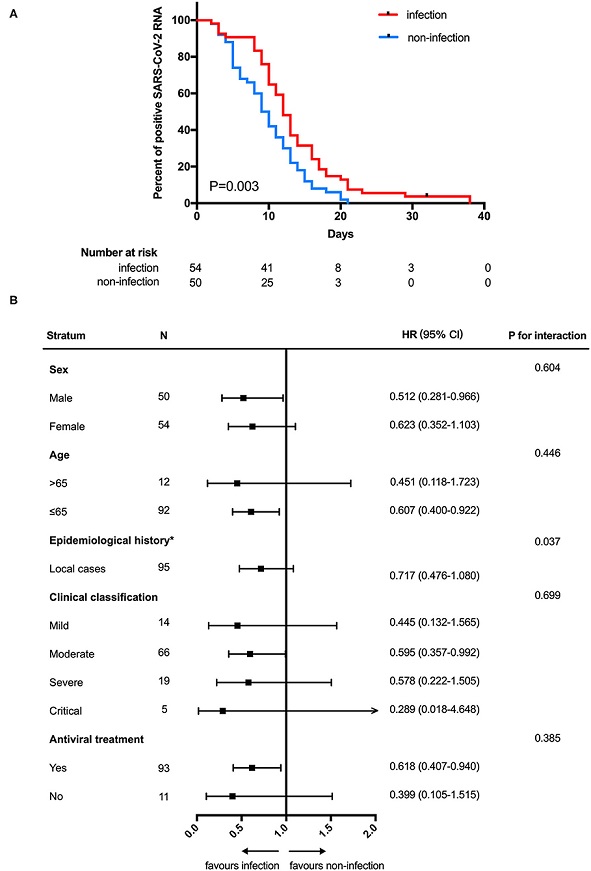Nikhil Prasad Fact checked by:Thailand Medical News Team May 25, 2024 1 year, 8 months, 3 weeks, 6 days, 10 hours, 10 minutes ago
COVID-19 News: The COVID-19 pandemic, caused by the novel coronavirus SARS-CoV-2, has been primarily recognized for its respiratory manifestations. However, emerging evidence suggests that the virus also targets the gastrointestinal (GI) system, which may significantly affect the clinical outcomes of the disease. A recent study by researchers at The Fifth Affiliated Hospital of Sun Yat-Sen University in China that is covered in this
COVID-19 News report, delves into the impact of SARS-CoV-2 GI infection on the recovery time from COVID-19, highlighting a crucial yet often overlooked aspect of the illness.
 Negative conversion time (A) Kaplan-Meier curve for the duration of SARS-CoV-2 RNA in respiratory tract samples between SARS-CoV-2 gastrointestinal infection and non-infection groups. (B) Subgroup analysis. NCT, negative conversion time; HR, hazard ratio. *The number of patients in the overseas case subgroup was too few for comparison.
Understanding SARS-CoV-2 GI Infection - Mechanism of Infection
Negative conversion time (A) Kaplan-Meier curve for the duration of SARS-CoV-2 RNA in respiratory tract samples between SARS-CoV-2 gastrointestinal infection and non-infection groups. (B) Subgroup analysis. NCT, negative conversion time; HR, hazard ratio. *The number of patients in the overseas case subgroup was too few for comparison.
Understanding SARS-CoV-2 GI Infection - Mechanism of Infection
SARS-CoV-2 primarily infects cells through angiotensin-converting enzyme 2 (ACE2) receptors, which are abundantly present in the respiratory tract and the GI epithelium. This dual affinity allows the virus to not only cause respiratory symptoms but also to infect the GI tract, leading to symptoms such as diarrhea, nausea, vomiting, and abdominal pain. Detection of the virus in fecal samples has been reported globally, reinforcing the notion of a GI involvement in COVID-19.
Previous Observations
Previous reports have confirmed the presence of SARS-CoV-2 in the GI tract. For instance, positive staining for the virus in GI epithelium and detection in fecal samples and biopsies have been documented. Despite these findings, the clinical implications of GI infection in COVID-19 patients remained largely unexplored until this study.
The Study: A Retrospective Cohort Analysis
The study analyzed 104 COVID-19 patients, dividing them into two groups: those with SARS-CoV-2 GI infection and those without. The primary endpoint was the duration for which SARS-CoV-2 RNA remained detectable in respiratory tract samples. The secondary outcome measured was the length of hospitalization.
Key Findings - Prolonged Viral Shedding and Hospitalization
Patients with GI infection exhibited a significantly longer duration of positive SARS-CoV-2 RNA in respiratory tract samples compared to those without GI infection (median 12.0 days vs. 9.0 days). Moreover, these patients also had extended hospital stays (median 28.0 days vs. 15.0 days). These findings underscore that GI infection not only prolongs the presence of the virus but also leads to a longer recovery period.
Detailed Results and Analysis
Among the 104 patients, 54 (51.9%) had GI infections. A notable difference in gender distribution was observed, with males being more prevalent in the infection group (63.0%) compared to the non-infection group (32%). Additionally, overseas cases were
more likely to have GI infections, suggesting potential regional variations in the virus's behavior.
Clinical Outcomes
In-depth analyses showed that GI infection consistently led to longer viral shedding and hospitalization across various subgroups, including different ages, sexes, and treatment histories. This consistency points to the significant impact of GI involvement on COVID-19 prognosis.
Persistently Positive Fecal SARS-CoV-2 RNA
A subset of 16 patients with persistent fecal SARS-CoV-2 RNA was studied to understand the viral load dynamics. The mean duration of positive fecal SARS-CoV-2 RNA was significantly longer than that of nasopharyngeal samples (25.81 days vs. 9.88 days). This prolonged presence in fecal samples suggests that the GI tract could serve as a reservoir for the virus, complicating and extending the infection course.
Implications for Clinical Management - The Role of ACE2 in GI Infection
The high expression of ACE2 in GI epithelial cells facilitates SARS-CoV-2 entry, leading to direct infection of the GI system. This study reinforces the need to consider GI involvement in COVID-19 management, especially since it prolongs viral shedding and hospitalization, thus impacting healthcare resources.
Gender and Regional Differences
The observed gender disparity, with males more susceptible to GI infection, aligns with previous studies suggesting higher susceptibility and severity in males. Additionally, the higher incidence of GI infections among overseas cases hints at possible variations in viral strains or population susceptibility, warranting further investigation.
Study Limitations
This study's retrospective nature and single-center design limit its generalizability. Additionally, the method used to detect GI infection (fecal rRT-PCR) may not capture all cases, potentially underestimating the true prevalence of GI involvement.
To confirm these findings and better understand the mechanisms, larger multicenter and prospective studies are necessary. Improved diagnostic criteria and methods will help provide a clearer picture of SARS-CoV-2 GI infection's impact on COVID-19.
Conclusion: A Call to Action
This study highlights the significant role of SARS-CoV-2 GI infection in prolonging the recovery time from COVID-19. With nearly half of the COVID-19 patients experiencing GI infections, there is a clear need to incorporate fecal SARS-CoV-2 RNA testing into routine diagnostics. Greater attention to GI symptoms and appropriate management strategies could help mitigate the extended burden of the disease, ultimately improving patient outcomes and reducing healthcare costs. As we continue to battle COVID-19, understanding and addressing all facets of the disease, including GI involvement, remains crucial.
The study findings were published in the peer reviewed journal: Frontiers in Medicine.
https://www.frontiersin.org/articles/10.3389/fmed.2021.683551/full
For the latest
COVID-19 News, keep on logging to Thailand Medical News.
Read Also:
https://www.thailandmedical.news/news/sars-cov-2-can-infect-cells-within-the-intestine-but-not-the-stomach
https://www.thailandmedical.news/news/sars-cov-2-spike-protein-impairs-gastrointestinal-tract-and-affects-mucosal-barrier
https://www.thailandmedical.news/news/covid-19-news-sars-cov-2-infected-children-show-persisting-gastrointestinal-symptoms-over-18-months-lactoferrin-helps
https://www.thailandmedical.news/news/breaking-medical-news-globally-1-in-12-will-develop-gastrointestinal-cancers-and-1-in-16-will-die-from-these-cancers
https://www.thailandmedical.news/news/herbs-and-phytochemicals-randomized-clinical-trial-shows-that-aniseed-powder-can-be-used-to-treat-gastrointestinal-issues-in-covid-19-infections
